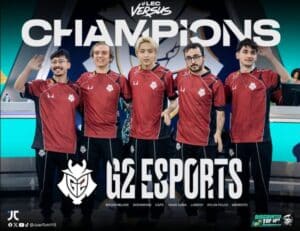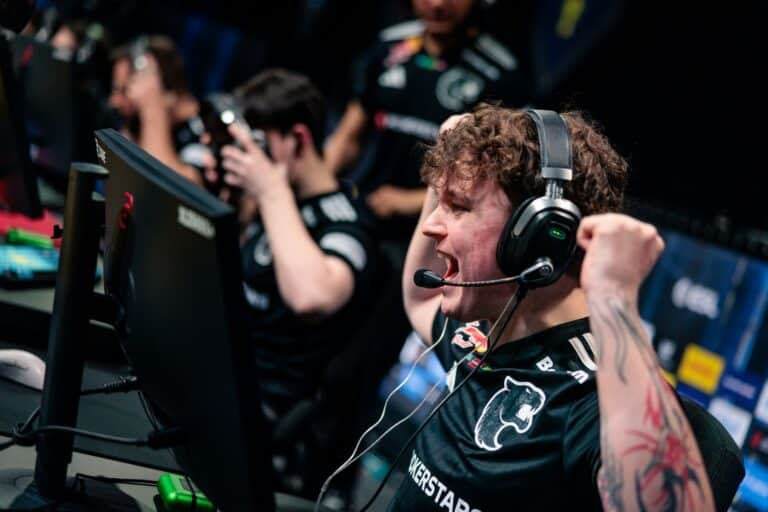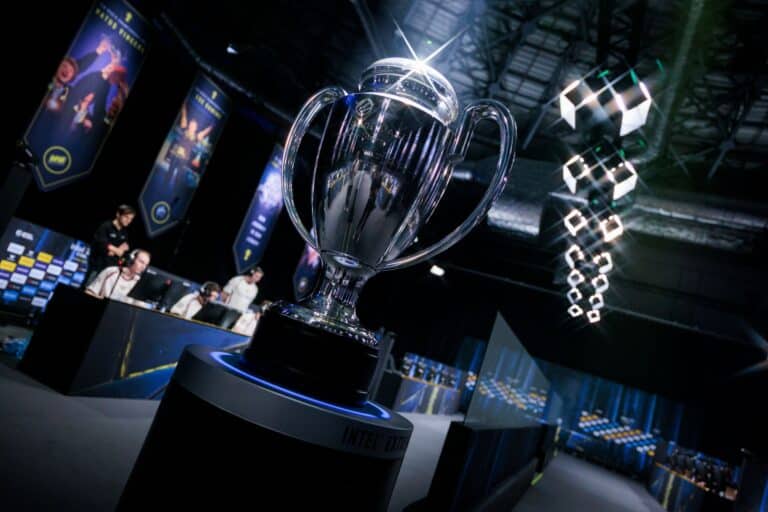“I think that Valve have to be the ones stepping in” – messioso on VRS one season on
Darragh Harbinson, Senior Editor
Last Updated: 14/07/2025
With the conclusion of the BLAST.tv Austin Major, Valve Regional Standings (VRS), has been the basis for the competitive Counter-Strike ecosystem for a full season. As we enter the second season in a few days, who better to review that season than Graham ‘messioso’ Pitt?
The Complexity CS General Manager has become well-known in the scene for being somewhat of a ‘VRS whisperer,’ communicating to the general public how VRS works, and pointing out potential pitfalls and loopholes in the system.
Part 3 of our interview with messioso discusses VRS, including how the first season of VRS has unfolded, issues in the VRS system, Valve’s communication, and ongoing problems with Counter-Strike’s new predominant ranking system.
Part 1 covers messioso’s journey into esports, eventually leading to his role in Complexity
Part 2 covers Complexity’s 2025 to date, from roster moves to their faltering Austin Major campaign.
I know of some tournament organisers who have been declined the possibility to do what other tournament organisers are then allowed to do, and that’s just crazy.
messioso on inconsistency in VRS
We’re a season into VRS being active, like the active system that’s being used. What’s your general feeling after a season of VRS?
I think the VRS has some obvious issues. Let’s take the invite list that went out like two days ago. That invite list was for like five different events over the course of the next three and a half months.
So if you were in the top 12 of that invite list, you basically have every single invite for the rest of the year, pretty much guaranteed, because there’s no way if you’re a top 12 team now that you weren’t pretty much top 12 or at least top 16 in the last two invites, for the most part.
Which means that you have FISSURE, you have Cologne, you have BLAST Bounty, you probably have EWC, you probably have Blast Open, you probably have FISSURE 2 or Star Series, which are both at the same time, and you probably have ESL Pro League.
That gets you through basically till the major cutoff, and all those events in between will also count towards the PGL Bucharest Season 2 cutoff; they’ll count towards the CAC cutoff — events in October, basically.
So it’s next to impossible for any of those teams to ever drop out of the top 16, because they’re just going to have so many events that even if they play dogs**t in and finish dead last, the prize money will bump them up, and they’ll have the next event to do well in. As long as they don’t do terrible at every single one, which is unlikely, then they’ll be fine.
Meanwhile, you’ve got the flip side, where teams in the sort of tier two, and definitely the tier three region, are just completely starved for points, where it’s almost impossible for them to earn the points.
It’s compounded by a few issues, namely just the one that the matches they play are just so invaluable comparatively to a LAN match, which, to some degree, is correct, actually. It is correct, but the problem is that the teams that they’re trying to replace are playing those LAN matches, so the gap is just huge.
Qualifiers are next to non-existent. You’ve even seen higher-ranked teams decline invites to qualifiers now, because the possibility of them losing way more points than they gain is so significant that it’s not worth them to risk it.
You shouldn’t have a team who’s competing at the top 20 level have to decline invites to qualifiers because they stand more to lose than to gain.
There should never be a position where you’re so disincentivised to play an event because the risks of the points you could lose outweigh the potential that you can gain. So that’s an issue.
messioso on online qualifiers
Was that the decision you made for Pro League, or was that for a different reason?
It wasn’t the decision I made for Pro League, but you know, interesting thought point is, would I have made the same decision in the same position? We’re in Europe already right now, and the Pro League qualifiers this weekend, so we just couldn’t play. I mean, we could play, but on high ping, and that would be even stupider.
But the issue is that these online qualifiers are zero dollar tournaments, so they have the lowest multiplier of the points you can gain, and because the teams you’re playing against are worth so little points, not to say they’re worthless, but they are worth less points, t’s a tough one because you can make it sound really rude.
They are worth fewer points. Their value to beat is so little, but the only way it can be considered a good qualifier is if you win the whole thing and don’t lose a single match.
If you lose a single match, you will end up losing more points than you could ever possibly gain from the qualifier alone. So take it like a double elimination tournament, you could easily see us, if we lost two matches, we could gain maybe three points a win from some of these teams, and if we lose, we lose 30.
And at the level we’re at, losing 30 points, if you did that twice, losing close to 60 points, it would just be brutal for us. So I wasn’t given that theoretical question because of the fact that we already knew we weren’t going to be in the region.
I know at least one team in Europe that did the same thing, who was in a similar position to u,s where they’re pretty highly ranked compared to the teams they’re playing against in that qualifier.
Yet you know that a lot of those teams in that qualifier are more than capable on any day of turning up and beating you, and if you just lose two of those games, you can drop from rank 25 to rank 35 or rank 40, and then all of a sudden your invite situation looks very different.
And if you know that you’ve got guaranteed events coming up where you will be able to earn points, like IEM Cologne, for example, why risk it all on that one slot or that one event in two months’ time when you can potentially gamble…
It is gambling in a way, but you can say, ‘Hey, we back ourselves to earn the points we need from the events we have, and you don’t need to take essentially unnecessary risks.’ So that’s definitely an issue.
There should never be a position where you’re so disincentivised to play an event because the risks of the points you could lose outweigh the potential that you can gain. So that’s an issue. I don’t know how you fix that, not directly. It’s not something I’ve really thought about too much, but it’s clearly a problem.
The #ESLProLeague Season 22 invites are here! 🙌
— ESL Counter-Strike (@ESLCS) July 8, 2025
Check out all 20 teams who have received an invite below, 4 more teams will join them through the qualifiers! pic.twitter.com/OBzwusTDAh
I think the Valve, in general, need to take more oversight directly of what’s happening. I think they are being very passive in a sense that they will act upon things that are brought to their attention, but they won’t actively seek what the issues are, which is a problem.
To some extent, it does work. With their communication style, it makes it very tricky. And just to say, I’m not saying that their communication style is incorrect. I just think that with the system they’ve built, they need to be more involved, in my opinion.
I think that it’s going to be quite troublesome to continue the way we’re going. I think that the Valve are being too generous to tournament organisers who are wanting and willing to push the boundaries of what is and isn’t acceptable.
We just got another bunch of exceptions come through today, and some of them just make no sense. Some of them should just not be allowed. I don’t understand why we’re still making exceptions for tournament organisers who want to just basically openly break the rules.
The worst thing about it is that I talk to a lot of these tournament organisers. We discuss things that are going on.
I know of some tournament organisers who have been declined the possibility to do what other tournament organisers are then allowed to do, and that’s just crazy.
The fact that a tournament organiser says, “Hey, I want to do this thing with my event. Can I do that?” And Valve says no.
And then another tournament organiser asks the same question, and Valve says yes. And it’s like… The lack of transparency in their decision-making process must be angering some of the TOs. There’s just no way it can’t be.
I think the lack of transparency in general is concerning, because I feel like the whole point of VRS and the system they’ve built is that everything is transparent and everything is open, and that average Joe can go and see exactly who’s going to get the invites.
They can see how the teams are earning points. They know what financial incentives a tournament organiser is offering to teams to attend their events. Those are all good things, but then why is the transparency stopping at the point where it’s Valve’s decision-making that implicates or has an impact on a lot of things?
So a good example would be, I think we missed out on an invite to a very financially lucrative event because Valve decided to make an event ranked that shouldn’t have been ranked, and nobody knows why.
Valve just said, ‘No, that event’s going to be ranked,’ and it got ranked, and we didn’t get that invite. So yeah, I think there’s just a lot of things that Valve could do to improve the state at which the game is currently in.
I’m not saying anyone at HLTV has been incentivised to cover a specific event, or not cover a specific event, because BC.Game is playing in it, but they could be. As long as they could be, that is a conflict of interest.
messioso on HLTV and BC.Game VRS conflict of interest
You made a tweet about HLTV partnering with BC.Game as a conflict of interest.
Yeah, huge conflict of interest, that one.
BC.Game have a team and HLTV are the basis for VRS in terms of the match data. Do you think it’s acceptable that Valve have designed a system where they rely on third parties?
Yes, I do. I think there’s a number of issues. That is not to lay any blame at HLTV’s feet, because it’s not their blame to take, but the fact that essentially HLTV, I don’t want to say the word decide, like HLTV has a limited amount of manpower, people power that they can operate with.
So their coverage of events is limited to what they can cover. So when people are like, “Hey, you need to cover this event or this event, or why is my event not covered?” It’s like, well, at the end of the day, that comes down to HLTV’s discretion on whether they feel the event is worthwhile covering for their own purposes.
That can lead to certain regions or tournaments or whatever it is, not counting towards the world ranking, and maybe the event meets every criteria except for HLTV’s criteria of, “Hey, we can fit one more event in this month, which one should it be? This one, this one, or this one.”
I’m not going to blame HLTV for not hiring more people at their own cost. Ultimately, HLTV is paying these people to cover these matches. The impetus isn’t on them to pay more people more money out of their own pockets to make the world ranking be more inclusive.
So again, I don’t blame HLTV, but this is where I think that Valve have to be the ones stepping in and saying, “We are going to maintain the database of matches.”
They already have a system built into Dota where tournament organisers who want their matches properly counted within the game and everything else, they have to create a ticket.
Within that ticket, you then create all the matchups and everything else, and it’s all tracked. It’s all got statistics. It’s in a big database. That is what we ultimately need in Counter-Strike.
Then that would also give Valve a lot more control over who the tournament organisers are. Have they actually requested permission from us to run an event in this way?
Right now the system basically works is a tournament organiser creates their event. They go to HLTV and say, “Hey, this is our event. Will you cover it?” and then HLTV at that point makes the distinction of, “Hey, this event is going to be ranked or not because it meets the criteria.” Valve technically doesn’t have to be involved in that process.
So I feel like Valve is leaning on HLTV more than they should be. I think they’re capable of bringing that part of the equation in-house, and that wouldn’t detract from what HLTV is providing.
It would be a separate thing that is purely for the ranking, and it would mean that their coverage could be more extensive. Their control could be more extensive. I think both of those things are pretty essential for what they’re trying to achieve.
And, you know, it is a conflict of interest for HLTV to be partnering with a betting company that has a team that they could be incentivised to, again, I’m not saying they have done this.
I just want to clarify, I’m not saying anyone at HLTV has been incentivised to cover a specific event, or not cover a specific event, because BC.Game is playing in it, but they could be. As long as they could be, that is a conflict of interest, and that’s all I wanted to highlight. I wasn’t saying that HLTV are doing this, they’re the devil, because they’re not. But it has to be highlighted.
Quite obviously BC Game sponsoring/partnering with HLTV while a team owned by the same company participates in ranked VRS tournaments is a conflict of interest. https://t.co/QITJkuaeNr
— Graham Pitt (@messioso) June 21, 2025
Ultimately, saying to HLTV, “Hey, you can’t go and make money because Valve use your data,” is kind of messed up because HLTV are a third-party company, and who they choose to partner with is ultimately up to them. If they choose to partner with a mass murderer, then yeah, you can tell them that you don’t like the fact that they’ve partnered with a mass murderer, but that’s obviously unlikely.
My point is that they should be free to choose what decisions they make for the best of their company.
But the fact that now those decisions also affect, or potentially could affect, their coverage and the world ranking it should be highlighted. Ultimately, it’s down to Valve to say to HLTV, “Hey, you can’t do this because of this reason,” but I don’t think they will.
So yeah, it’s a tough one, a really tough one. I don’t envy anyone in those positions, let’s say that at least.
Valve have just massively incentivized the pushing of prize money into the ecosystem. Which is—I’m going to get myself into a bit of trouble with the players here—but is not the best way to invest money into the ecosystem.
messioso on prize money’s effect on VRS and the scene
We’ve touched on the LAN factor being incredibly important for VRS. It is bringing a lot of international teams to Epic LAN, because they’re chasing those points, but it arguably has too big an effect. Do you think that’s justified by having events and incentivising events?
I think for me, the LAN wins thing is not bad, and it’s not good. The thing is, if you took away the LAN wins aspect of the ranking, then the teams who are actually performing at these S-tier LANs would not be in the ranking necessarily where they should be, because the value taken away from that would be quite damning.
So, to some extent, something like the LAN wins does need to exist. I don’t think it’s in the right place right now, where winning a match at EPIC.LAN is the same as winning the major final in terms of one LAN win being equal to one LAN win.
It doesn’t matter if it’s a best-of-three at EPIC.LAN and a best-of-three at a major final. I don’t think those two things should be counted equally. I think that just makes sense to everyone. On the flip side, I love the fact that grassroots esports is getting a boost.
I think it’s great that EPIC.LAN is getting all these teams to go to their events because of the value that is built upon that one singular feature of the VRS. So it does tear me a little bit because it is healthy for the ecosystem to have these kinds of events and to have the openness of those events.
So it’s a really tough one, but I do think for the integrity of the ranking, there needs to be a slight change. Whether that’s like tier two events having a slightly lower multiplier, maybe they get half a LAN win, so you have to win double the amount to get to the same level.
That would be one way of fixing it, or at least making the reward more scaled to what you’ve achieved, I think is the way I would put it. Because it is possible for teams to basically get from obscurity to tier one invites just through that method, which probably isn’t correct.
Again, a lot of this is sort of philosophical, theoretical, just because it’s what do you believe is correct rather than what necessarily is correct, but I think that’s one way. Just to give you an idea, I think a LAN win right now is worth like 45 points, just like flat 45 points.
It’s a bit more complicated than that because of different factors of scaling and how things happen, but essentially it’s worth about that many points, which means that a team who’s sort of middling in tier two Europe can go from like 1,000 points to like 1,250 points in a single LAN. That puts them into kind of top 25-ish territory, which puts them in invite territory for some events.
It’s sort of like the very top of the VRS is completely secure. The next phase is just completely open to teams playing open LANs, and then below that is just all the teams who want to play open LANs but can’t.
I feel like the VRS should mean more than that to me, but I’ll be honest, I don’t have a good solution for it. It’s really not so simple. I think the thing that I think is more simple to fix is the fact that every event’s value essentially is based on the prize money.
I think that is something that I raised to Valve back in like March 2024 was just that telling you an event is the most value based purely off prize money, it doesn’t tell the whole story, right?
Because different events can have different prize monies but completely different teams, and the prestige of winning those events or winning matches at those events is, let’s be honest, based on the teams that you beat rather than the prize money.
So you can have some of the most famous events for the highest prize money in Counter-Strike was WESG, which had like a $1.5 million prize pool back in like 2018. I think their events were weird because I think they took place the year before they finished.
So I think the 2017 event finished in 2018 and blah, blah, blah. But yeah, they had like $1.5 million prize pools and the teams that won those events because they had to be fully of one nation, so it had to be like all French, all USA, all Polish, whatever it was.
The level of quality of the teams at that event was so much lower than a typical $1.5 million event would be. I mean, back then, there were no $1.5 million events.
So those events in the current VRS system would count as much as a Cologne or a Katowice, and it’s just clear from the team list that they’re not that strong.
So I feel like Valve has just massively incentivised the pushing of prize money into the ecosystem. Which is—I’m going to get myself into a bit of trouble with the players here—but it is not the best way to invest money into the ecosystem, and ultimately, 80% to 90% of all prize money goes straight into the players’ pockets.
And that’s not to say that they don’t deserve a bonus for performance, because they do, but the idea that they’ve essentially started a prize money arms race purely to satisfy the necessities of the ranking is the wrong way to go about it, in my opinion.
I feel like an event’s prize money should either be based solely on the quality of the teams attending, because the best events will always have the best teams in attendance. The best teams will not skip the high prestige best events, and the best teams will generally always go to the high prize money events anyway.
So maybe there’s an element of mixing prize money and quality of teams. I think, weirdly, ESL did it quite well with their ranking, where they basically said, like, “Hey, if eight of the top 12 teams in the world are attending this event, it’s a high value event,” because the eight of the top 12 teams in the world are attending.
But they also had the system where it worked for local regions as well. So if the eight best North American teams were attending a North American event, that was a high value event in North America, but then there was still a strength of region cap, which limited it.
So it wasn’t worth the same as a European event, for example, where the competition is stronger. So I think ESL somewhat had a good idea of how to balance that and how to rank an event’s strength, and I think Valve could not copy it, because it wasn’t perfect.
Ultimately, saying how strong a region is is very tough, but certainly the idea of the fact that team strength contributes to the event’s value, I think that’s something that needs to be incorporated somehow.
I think that would be my number one immediate fix: just remove the prize money arms race and remove the fact that winning a poorly attended high prize money event—which, you know, I know people will say FISSURE is coming up this week.
It’s a $1 million event, and it’s going to count fully on the VRS. I think everyone can see that the team list is not the strongest, it’s missing like eight or nine of the top 10 teams, but it will count the same.
Every dollar of prize money will count the same as a Katowice or Cologne or a Major. In fact, to some degree, it’ll count more than a Major, but it’s something like that has to be taken into consideration.
It is just crazy that you can just value an event’s worth based purely on the amount of money invested in it, to me.
💥 Everything you need to know about PGL Astana 2026 🇰🇿
— PGL (@pglesports) July 9, 2025
📅 May 7–18, 2026
📍 Astana, Kazakhstan
🏟️ Playoffs: Barys Arena
🌍 12 top Global VRS teams invited
🧩 4 teams join via Open & Closed Qualifiers (Online)
💰 $1,600,000
🎫 The tickets will go on sale soon!
📰 Read all the… pic.twitter.com/XHOuDnK0ai
PGL have unveiled their equivalent to the club share. You don’t think that that kind of model has kind of solved the issue from a business point of view?
No, it solved it potentially from a team financial perspective. I do think that is a much better split, but I would say that as a, not a team owner, but an organisation representative.
The prize money can’t just be going all to the players. There has to be a kickback for the organisation.
Ultimately, what should happen is that every team needs to renegotiate all their contracts with all their players so that the idea that the teams take a significant portion of the prize money is factored in.
The truth is that getting every team to renegotiate every contract is going to be a bit too much. So they’ve just split the prizes in half, or split the prizes, however they split it, and it is what it is. The ultimate effect is the same; it’s just confusing. I don’t think that changes too much because that’s more of a financial aspect to the teams.
The reason it has been done that way… PGL might be more willing to do other types of financial incentives, whether it’s like what ESL have with the viewership.
Where you get ranked each event based on your viewership, and you earn prize money. You earn revenue through the year based on how many events you attend, what your viewership is. So your viewership is your contribution to their event.
If you’re a high-value team who brings in all the eyeballs and can help an event prosper, then you get a kickback from that. PGL might be more willing to do something like that if taking that money away from their prize pool or the club share didn’t affect the ranking that much.
Again, I don’t know if PGL would do that, I’m just saying, like they could be. So I think that the fact that the rankings rely so heavily on prize money also stunts the growth of the other aspects of the ecosystem.
So, I think there’s room for improvement there for sure.
Darragh Harbinson, Senior Editor
Darragh Harbinson is an esports writer specialising in Counter-Strike. He has written for Esports News UK, Esports Insider, UKCSGO, Dexerto, and Rush B Media.
Stay Updated with the Latest News
Get the most important stories delivered straight to your Google News feed — timely and reliable





From breaking news and in-depth match analysis to exclusive interviews and behind-the-scenes content, we bring you the stories that shape the esports scene.
Monthly Visitors
User Satisfaction
Years experience
Latest Interviews











